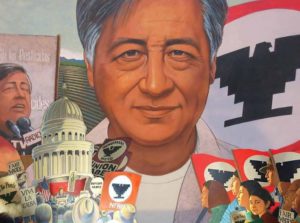
Cesar Chavez, the iconic labor leader, would have been 90 years old today, and progressives, including teacher union leaders, are pausing to honor him. But few of them probably realize Chavez’s vision of a better world – the same vision that led him to organize the most abused workers, and battle the biggest corporations – included scenes of community empowerment from earlier chapters in the school choice movement.
Chavez was a steadfast supporter of Escuela de la Raza Unida, a forgotten “freedom school” in Blythe, Calif. that sprouted in 1972, in the wake of mass parental frustration with local public schools. Some of his comments about this school in particular, and public education more generally, can be found in this rough-cut documentary about the school’s creation.
“We know public education has not … been able to deal with the aspirations of the minority group person or, in our case, our kids who have been involved with the struggle for social betterment,” Chavez tells an interviewer at about the 7:30 mark in the video.
“The people who run the institutions want everybody to think the same way, and it’s impossible,” he continued at another point. “We have different likes and dislikes, and different ideals. Different motivations. And so I’m convinced more and more that the whole question of public education is more and more not meeting the needs of the people, particularly in the case of minority group people … “
The success of Escuela de la Raza Unida is proof, Chavez said, that truly community-led schools are needed – and can work.
“Gradually,” he predicted, “we’re going to see an awful lot of alternative schools to public education.”
The Blythe school remains a community institution, but it is not the K-12 school its founders envisioned. California does not have state-supported private school choice programs, so low-income parents couldn’t afford to keep their children there, no matter how much they wanted to.
Over the years, the school’s supporters have applauded efforts to bring private school choice to California. In the late 1970s, Berkeley law professors John Coons and Stephen Sugarman led one of those campaigns, which, after a horrendous twist of fate, failed to get enough signatures.
According to Coons, Chavez said he wanted the United Farm Workers to rally its troops in support, but could not risk the substantial financial backing it received from the teacher union.
Si, se puede! But not quite yet.


